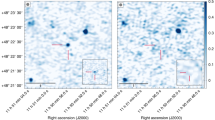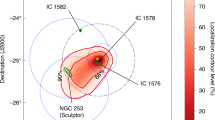Abstract
AFTER the radioastronomical detection1 of helium in 1966 a programme to study the 109α transition of neutral helium was begun at the US National Radio Astronomy Observatory, and helium has now been detected in five sources (as will be described elsewhere). During the course of this work, however, unidentified microwave spectral emission has also been detected in the sources NGC 2024 and IC 1795. This communication describes the observed physical characteristics of this emission, considers its possible origins and suggests further observations to identify it. In the succeeding communication, Goldberg and Dupree argue that the new line is a recombination line of carbon I.
This is a preview of subscription content, access via your institution
Access options
Subscribe to this journal
Receive 51 print issues and online access
$199.00 per year
only $3.90 per issue
Buy this article
- Purchase on Springer Link
- Instant access to full article PDF
Prices may be subject to local taxes which are calculated during checkout
Similar content being viewed by others
References
Lilley, A. E., Palmer, P., Penfield, H., and Zuckerman, B., Nature, 211, 174 (1966).
Zuckerman, B., Palmer, P., Penfield, H., and Lilley, A. E., Astrophys. J. (in the press).
Author information
Authors and Affiliations
Rights and permissions
About this article
Cite this article
PALMER, P., ZUCKERMAN, B., PENFIELD, H. et al. Detection of a New Microwave Spectral Line. Nature 215, 40–41 (1967). https://doi.org/10.1038/215040a0
Received:
Issue Date:
DOI: https://doi.org/10.1038/215040a0
This article is cited by
-
Carbon recombination lines from the Galactic plane at 34.5 & 328 MHz
Journal of Astrophysics and Astronomy (2001)
-
High resolution radio recombination line observations
The Astronomy and Astrophysics Review (1992)
-
Molecular cloud edges:Cii andSii layers in neutral interfaces near ionisedHii regions
Astrophysics and Space Science (1987)
-
A classification of the available astrophysical data of particular Hii regions
Astrophysics and Space Science (1979)
Comments
By submitting a comment you agree to abide by our Terms and Community Guidelines. If you find something abusive or that does not comply with our terms or guidelines please flag it as inappropriate.



